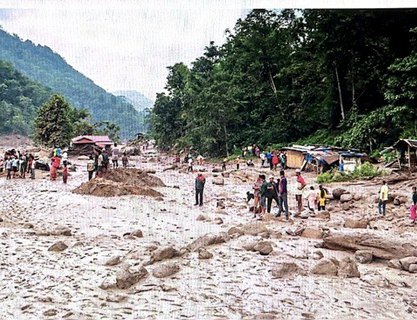
National security and foreign policy are under severe threat due to climate change, a global issue that has been impacting the world. One region particularly vulnerable to these impacts is South Asia, including Nepal, which is categorized as one of the most vulnerable nation. The changing climate poses a significant threat to the region, where up to 800 million people, already among the world's poorest and most vulnerable, could experience a sharp decline in their living conditions.
Human-induced climate change, primarily caused by the release of greenhouse gases from burning fossil fuels, has far-reaching consequences. Rising sea levels, more frequent and severe heat waves, droughts, floods, and storms are some of the adverse effects impacting the environment, human health, and the economy.
Melting glaciers serve as visible indicators of climate change in the Himalayas, with significant implications. These glaciers are the source of major rivers in Asia, such as the Ganges, Brahmaputra, Mekong, Yangtze and Indus among others that originate in the Himalayas. These rivers sustain an estimated two billion people in South and Southeast Asia. As the glaciers melt, the rivers swell, leading to increased risk of landslides and floods. Nepal, in particular, faces the formation of glacial lakes due to glacier melting, increasing the risk of devastating downstream floods if these lakes burst.
The impact of climate change on South Asia and Nepal cannot be underestimated. The region is already experiencing intensifying heat waves, cyclones, droughts, floods, and unpredictable monsoons, which strain the capacity of governments, businesses, and citizens to adapt. Over the past two decades, more than half of all South Asians, totaling 750 million people across Afghanistan, Bangladesh, Bhutan, India, Maldives, Nepal, Pakistan, and Sri Lanka, have been affected by one or more extreme climate-related events, mention can be made of the floods in Pakistan, the Melamchi project in Nepal and the current floods and landslides in North India.
Nepal relies on hydropower for its energy needs, and the country has invested heavily in this sector. However, climate change is impacting water resources and energy security, which could have a significant impact on Nepal's economy. Changes in water availability; influenced by melting glaciers, have profound implications for the country's hydropower generation. Furthermore, the resultant landslides and floods pose threats to Nepal's infrastructure and agricultural sector, compounding the challenges faced by the nation.
Agriculture is a major source of livelihood for millions of people in Nepal and is particularly vulnerable to the impacts of climate change. Rising temperatures, changes in rainfall patterns, and more frequent extreme weather events are all having a negative impact on agricultural productivity, leading to food insecurity, increased poverty, and social unrest. To mitigate the impacts of climate change on agriculture in Nepal, there are a number of steps that can take, such as adopting climate-friendly and providing agricultural practices investing in research and development to create new crop varieties better suited to the changing climate and providing financial assistance to farmers affected by climate-related disasters.
Additionally, it is also important to take a gender sensitive approach to climate change in Nepal. Women are disproportionately affected by climate change, as they are more likely to be poor and marginalized and have less access to resources and decision-making power. It is essential to include women in the design and implementation of climate change adaptation and mitigation measures to ensure that the most vulnerable citizens are not left behind.
A just transition to a low-carbon future requires collaboration and cooperation between different stakeholders, including governments, development partners, civil society, the private sector, indigenous peoples, and other communities, to ensure the burdens and benefits of climate change are shared equitably.
Cooperation is essential to mitigate the effects of climate change and achieve sustainable development. Cooperation is the only chance humanity has in the face of unprecedented climate change. The impact of climate variability and climate change on human and natural systems poses serious challenges to our objective of reducing poverty and achieving sustainable development.
In conclusion, human-induced climate change has global ramifications and poses significant risks to national security and foreign policy. South Asia, including Nepal, is particularly vulnerable to climate shocks, as evidenced by melting glaciers, landslides, and floods. Urgent action is necessary from governments, development partners, businesses, and citizens to mitigate climate change's consequences and adapt to the changing climate. By addressing this crisis collectively, we can strive towards a more secure and sustainable future for all.
Rajouria is a former Member Secretary of NTNC. He also worked for UNDP, UN-Habitat, UNEP and USAID. He completed MPA from Kennedy School of Government, Harvard University, and Climate Change &Public Policy Issues. Chairman, Climate & Co-Existence, and is also on the Board of like minded organizations.

Arup Rajouria
is an internationally recognized expert in climate change and natural resources management, with an impressive career at renowned organizations such as the former CEO of NTNC's CEO, UNDP, UN-Habitat, UNEP, and USAID. He obtained an MPA degree from Harvard
- Glaciers Demand: Annapurna’s Lesson
- Jun 05, 2025
- 2024: A Year Of Missed Opportunities- A Call For Transformative Climate Action In 2025
- Dec 31, 2024
- Himalayan Meltdown: Threat Beyond Borders
- May 10, 2024
- Navigating The River of Doubts: The Evolving Dynamics Of India-Nepal Water Relations
- Jan 08, 2024
- A Cry From The Himalayas: Echoes Of Hope And Compromise At COP-28
- Dec 21, 2023












